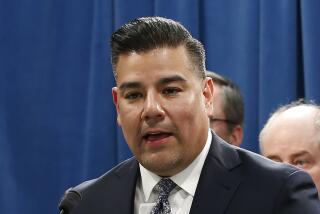Dispute Among Campbell Heirs Boils Over; Three Say They’ll Sell
The family that has controlled the Campbell Soup Co. for more than a century and made its red-and-white soup cans a common sight in the nation’s cupboards has split over ownership of the giant food maker.
Three nieces of Campbell’s late chairman, John T. Dorrance Jr., and their husbands on Thursday said they want to sell their 17% stake in Campbell. In a filing with the Securities and Exchange Commission, the group said it would seek “a price per share significantly in excess of current market value.” Shares, until the past several days, had been trading in the $40 range.
The group also said it would encourage Campbell’s directors to do the same and consider ousting those who oppose a sale. One of the nieces, Dorrance Hamilton, sits on the company’s board.
Last week, three children of Dorrance, who died last April, issued a statement saying they intended to maintain their ownership in Campbell and keep the company independent. The three recently received control of their father’s 31.3% stake in the company.
A Campbell spokesman said the company had no comment.
Rumors of a simmering family dispute have stirred up takeover speculation and boosted the price of Campbell shares in recent weeks. On Thursday, Campbell shares on the New York Stock Exchange rose $4.375 to close at $57.375.
Thursday’s filing “magnifies and brings to actuality the discord we’ve been hearing about among the family,” said Mary Harden, an analyst with Duff & Phelps in Chicago.
The Dorrance family has been involved with the company since 1876, when Arthur Dorrance joined a fruit and vegetable canning partnership founded by Joseph Campbell in 1869 in Camden, N.J.
The company’s fortunes took off after Dorrance’s nephew, John Thompson Dorrance, invented condensed soup. The product, which removed water from the soup, permitted a more convenient method to distribute canned soups nationwide.
John Thompson Dorrance, who was Campbell’s president when he died in 1914, left behind an estate valued at $115 million, according to Everybody’s Business, a guide on corporate history and information. Dorrance’s son, John Thompson Dorrance Jr., eventually became chairman of the company.
Under the Dorrances, Campbell developed a reputation as a strait-laced, no-nonsense company. Smoking was prohibited in its Camden, N.J., headquarters, and most Campbell executives shared their offices with secretaries to save on expenses.
Besides a commercial success, Campbell’s soup became an American icon of sorts. Late pop artist Andy Warhol used Campbell soup labels in many of his works.
Campbell slowly began to diversify by buying other food makers, such as Pepperidge Farm products, Swanson frozen dinners and Vlasic pickles.
But in recent years, analysts have faulted the company for failing to modernize its facilities and come up with new products to keep up with competitors. Campbell has sought to boost profits by shuttering plants and laying off workers. The most recent shutdown included Campbell’s original canning factory in Camden.
For the fiscal year ended July 30, Campbell reported sales of $5.7 billion and earnings of $13.1 million, sharply lower from $274.1 million the previous year. The profit decline was blamed on the cost of factory shutdowns. In November, R. Gordon McGovern stepped down as Campbell’s chief executive and president; he has yet to be replaced.
Harden said the dissenting family members may have difficulty finding a prospective buyer willing to pay top price for Campbell.
“They’re assuming it’s somebody out there with deep pockets,” she said. “I’m not certain in this investment environment that they’re going to find an investor . . . willing to pay the kind of prices they’re looking for.”
CAMPBELL SOUP CO. AT A GLANCE
The Camden, N.J., firm’s units include Campbell’s soups, Swanson frozen foods, Prego spaghetti sauce, Pepperidge Farm bakery products and Godiva chocolates.
Year ended July 31 1989 1988 Revenue (millions) $5,700 $4,900 Net income (millions) $13 $274
Employees: 48,500
Stockholders: 36,000
12-month price range: $60.625-$30.50
Thursday’s close (NYSE): $57.375
More to Read
Inside the business of entertainment
The Wide Shot brings you news, analysis and insights on everything from streaming wars to production — and what it all means for the future.
You may occasionally receive promotional content from the Los Angeles Times.









